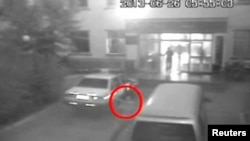A Chinese court has sentenced three men to death over a deadly June riot that Beijing blames on Muslim extremists in the western Xinjiang province.
The Xinhua news agency said Friday the men were found guilty on charges including murder, arson, and participating in a terrorist group. A fourth man was sentenced to 25 years in prison.
The court said the men "advocated and spread religious extremism, watched violence-inciting videos from foreign terrorist organizations, and read books on religious extremism" in preparing for the attack.
Xinhua initially reported 35 people were killed when "knife-wielding mobs" attacked police stations and other government targets in Shanshan county. On Friday it said the attacks killed 24 people, including two police officers.
The riots were the worst violence in years in Xinjiang province, which occasionally sees clashes between members of the mainly Muslim Uighur minority and the Han Chinese majority.
Beijing blames much of Xinjiang's recent unrest on what it calls Uighur terrorists affiliated with the banned East Turkestan Islamic Movement (ETIM) and trained in neighboring Pakistan.
Uighur rights activists say most of the violence in Xinjiang is the result of Han Chinese suppression of Uighur culture and economic opportunities.
The Xinhua news agency said Friday the men were found guilty on charges including murder, arson, and participating in a terrorist group. A fourth man was sentenced to 25 years in prison.
The court said the men "advocated and spread religious extremism, watched violence-inciting videos from foreign terrorist organizations, and read books on religious extremism" in preparing for the attack.
Xinhua initially reported 35 people were killed when "knife-wielding mobs" attacked police stations and other government targets in Shanshan county. On Friday it said the attacks killed 24 people, including two police officers.
The riots were the worst violence in years in Xinjiang province, which occasionally sees clashes between members of the mainly Muslim Uighur minority and the Han Chinese majority.
Beijing blames much of Xinjiang's recent unrest on what it calls Uighur terrorists affiliated with the banned East Turkestan Islamic Movement (ETIM) and trained in neighboring Pakistan.
Uighur rights activists say most of the violence in Xinjiang is the result of Han Chinese suppression of Uighur culture and economic opportunities.





